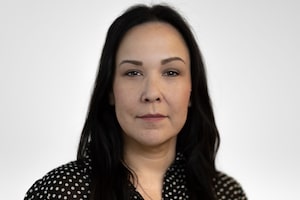
Indigenous Services Minister Patty Hajdu responds to a question during a news conference in Ottawa on Jan. 4.Adrian Wyld/The Canadian Press
It was still dark outside and a frigid -36 degrees with the wind chill when Garrett Ugray and a group of his cousins arrived at the Thunder Bay airport in the early morning of New Year’s Day. They were there to jump on a chartered plane that would fly them north to their Bearskin Lake First Nation community to cut firewood for people under lockdown because of a COVID-19 outbreak.
“They didn’t have the bodies to go out and do it,” Mr. Ugray said. “And a lot of the homes rely on firewood for heat.”
About half the households in Bearskin were under isolation after the first confirmed Omicron case on Dec. 28. It eventually infected approximately 210 people in the remote community of about 400.
Mr. Ugray said it was like a ghost town when they arrived, with nothing in sight except the trucks local leadership had arranged for the group to use while harvesting wood.
The group of volunteers were there for just the day, and with only a few hours of daylight, to collect as much wood as possible – six truck loads to be exact. They dropped the wood off in the school parking lot before flying back to Thunder Bay. The volunteers had no contact with anyone except the chief, who thanked them at the airport before they left.
Mr. Ugray said he didn’t hesitate when his cousin asked if he could make the trip.
“You get a call in Thunder Bay to go way up north to your home community to cut firewood because they need that, there’s a sense of urgency,” he said.
Surrounding First Nations also stepped up, raising more than $100,000 and putting together convoys of snowmobiles and trucks to deliver goods on the ice roads.
Tania Cameron, a community volunteer from Kenora, Ont., put out a call for donations on New Year’s Eve, raising more than $54,000 from 310 donors – including $21,000 from Keewaywin First Nation – to purchase and ship supplies to Bearskin Lake.
Ms. Cameron was familiar with the panic and worry of COVID-19 after her teenage son got infected during the holidays. But she also had friends who delivered essential supplies when her entire family had to isolate.
“In the north, you’re just so isolated,” she said. “You don’t have two, three grocery stores to go choose from.”
Ms. Cameron said she saw anxious parents posting on Facebook, looking for groceries, Tylenol and humidifiers.
“That really upset me,” she said. “Here I have all these resources available to me because I’m in Kenora.”
“If I could send food up there, then that can alleviate some of the immediate needs of the families and elders that were in isolation,” she said.
Ms. Cameron arranged to buy and ship groceries through a grocery store in Sioux Lookout – a five-hour return trip for Ms. Cameron and her husband – using the federal nutrition north subsidy that offsets expensive freight costs.
She also arranged to ship things such as extension cords, work gloves and a log splitter through the local health authority.
But Ms. Cameron said there were other logistical challenges.
“Yes, supplies are coming in from neighbouring communities, from people like me sending up food, but what do you do with the food?” she said. “What do you do with the supplies that are arriving into the community if there’s no one there to get it to the households?”
It was a reality that had Chief Lefty Kamenawatamin worried; a small group of volunteers he called his “army” – about 20 people – were exhausted with no one else to provide relief as more people became infected. On Jan. 3, he publicly requested military support. Provincial and federal authorities took days to process the request and in the end, only deployed a handful of mostly local Canadian Rangers.
Mr. Kamenawatamin felt let down. At home, recovering from COVID-19 himself, he issued a statement this week calling the response “another example of a long history of dishonesty and neglect from Canadian governments.”
Charles Fox, a former grand chief of Nishnawbe Aski Nation and member of Bearskin Lake, said the government needs a more effective emergency-response plan.
“What are the lessons learned here?” Mr. Fox said about the need for better protocols at both the community and government levels.
Eric Melillo, the Conservative member of Parliament for Bearskin Lake agrees, calling the federal response to the community’s request for military support inadequate.
“We need to make sure that if something like this is going to happen again, if there’s going to be another outbreak, that the government can respond much quicker,” he said.
Indigenous Services Canada said it approved $1.1-million in emergency funding to Bearskin Lake, and helped co-ordinate efforts on the ground.
Mr. Ugray said he’s not surprised how people and communities have been able to come together to help out.
“Reaching out to other relations and other communities nearby, being able to help out, that’s how we’ve always survived.”
Sign up for the Coronavirus Update newsletter to read the day’s essential coronavirus news, features and explainers written by Globe reporters and editors.
 Willow Fiddler
Willow Fiddler